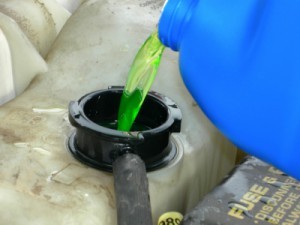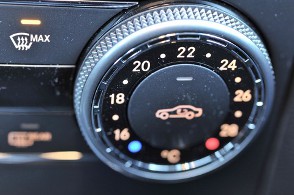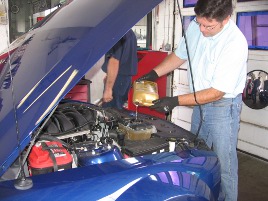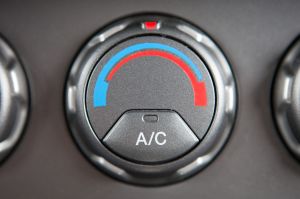 Let’s talk about air conditioning service and repair issues today. Most of us in Denver don’t give our air conditioning a second thought – just as long as it’s making cold air. But it’s a complex and expensive system that we should think more about before it starts blowing out hot air.
Let’s talk about air conditioning service and repair issues today. Most of us in Denver don’t give our air conditioning a second thought – just as long as it’s making cold air. But it’s a complex and expensive system that we should think more about before it starts blowing out hot air.
The refrigerant in the air conditioner contains a special oil that lubricates and cools the A/C parts. When enough refrigerant leaks out, your air conditioner still makes cold air, but the parts don’t have enough oil to protect them and they wear out faster than they should. That’s why it’s so important to service the air conditioner as recommended by your service center.
Replacing old refrigerant has another benefit: refrigerant tends to gather moisture and become corrosive. That causes leaks in the system which can be expensive to repair. Fresh refrigerant protects the air conditioning components and keeps the system operating at peak efficiency so it doesn’t have to work as hard to keep you cool.
Even with regular service, A/C parts can just wear out. Normal wear and tear eventually affects all moving parts.
Addressing early problems can save on more extensive repairs down the road. For instance, a common failure is the clutch that turns the compressor on and off. If you can take care of a bad A/C clutch when it first starts having problems, you may be able to save the compressor. But if you wait too long you’ll have to replace them both.
Check your owner’s manual or ask your service adviser for service recommendations. And if you are hearing strange sounds when your air conditioning turns on, or if it just isn’t as cold as it used to be, have us give it the once over and see what it will take to keep you cool.

 Express Car Care Question: I was driving down the freeway in Denver and smoke started coming out of my car. I pulled over and called my husband. I had to be towed to my mechanic. He said my car had overheated. What can I do to prevent this from happening in the future?
Express Car Care Question: I was driving down the freeway in Denver and smoke started coming out of my car. I pulled over and called my husband. I had to be towed to my mechanic. He said my car had overheated. What can I do to prevent this from happening in the future?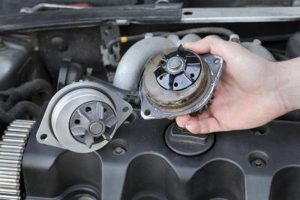 Let’s talk water pumps for vehicles here in Denver. The engine in your vehicle is cooled by coolant/antifreeze mixed with water. This mixture circulates around the engine, absorbing some of the heat. The coolant then flows through the radiator where air cools it down for the return trip back through the engine. Your vehicle’s water pump is what drives this process.
Let’s talk water pumps for vehicles here in Denver. The engine in your vehicle is cooled by coolant/antifreeze mixed with water. This mixture circulates around the engine, absorbing some of the heat. The coolant then flows through the radiator where air cools it down for the return trip back through the engine. Your vehicle’s water pump is what drives this process.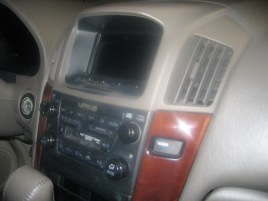 You may have wondered where the warm air in your passenger compartment comes from. Well, as your engine starts to warm up, it also warms the coolant/antifreeze that circulates around the engine and through the radiator. There is also a hose that carries coolant/antifreeze from the engine to the heater core and another one that takes it back into the engine. The heater core looks like a little radiator and lives in the air blend box behind the dashboard.
You may have wondered where the warm air in your passenger compartment comes from. Well, as your engine starts to warm up, it also warms the coolant/antifreeze that circulates around the engine and through the radiator. There is also a hose that carries coolant/antifreeze from the engine to the heater core and another one that takes it back into the engine. The heater core looks like a little radiator and lives in the air blend box behind the dashboard.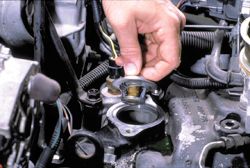 The thermostat on your vehicle is an important part of your cooling system. Your thermostat performs a similar function to the thermostat in your home. At home, you set your thermostat to maintain a comfortable temperature range. When your home gets too hot, the air conditioning kicks on and when it gets too cool, then the heater.
The thermostat on your vehicle is an important part of your cooling system. Your thermostat performs a similar function to the thermostat in your home. At home, you set your thermostat to maintain a comfortable temperature range. When your home gets too hot, the air conditioning kicks on and when it gets too cool, then the heater.